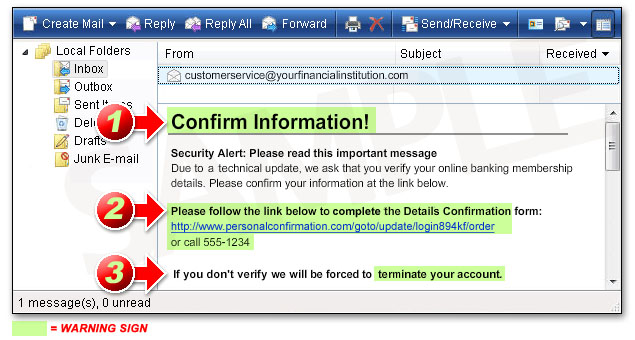Email Safety
 Phishing is an email scam used to steal your personal information. Email similar to the one pictured may appear in your inbox, claiming to be from your financial institution, credit card company, or another source. It may appear authentic but be careful - any email requesting personal information or to “verify” account information is usually a scam. Do not respond to this and do not click on any link from this email. Watch the Video
Phishing is an email scam used to steal your personal information. Email similar to the one pictured may appear in your inbox, claiming to be from your financial institution, credit card company, or another source. It may appear authentic but be careful - any email requesting personal information or to “verify” account information is usually a scam. Do not respond to this and do not click on any link from this email. Watch the Video
How to spot Phishing and other email scams
- Any email requesting personal information, or asking you to verify an account, is usually a scam... even if it looks authentic.
- The email may instruct you to click on a link, or call a phone number to update your account or even claim a prize.
- The message will often threaten a dire consequence if you don’t respond immediately, such as closing your account.
These are clear signs that someone is “Phishing” for your information.

Follow these steps to avoid email scams
- Never respond to any email asking for confidential information, even if it appears urgent. Chances are it is a fraudulent email.
- Never click on a link from an email. Instead, type the known Website address into your Internet browser.
- Do not call any phone number provided in a suspicious email. It could be a fake phone number.
- Always use anti-virus and anti-spyware software on your computer, and keep them up-to-date.
Remember, email is not a secure form of communication. So feel free to use your email, but don’t use it to send or receive confidential information. And if you follow the four basic steps listed, you can protect yourself from most phishing and other email scams.

